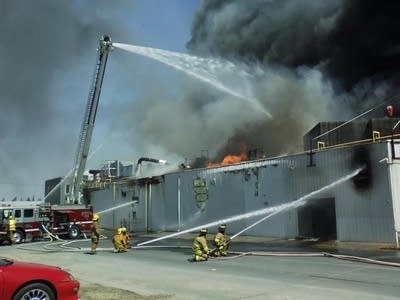Future unclear for workers of burned St. Charles plant
Go Deeper.
Create an account or log in to save stories.
Like this?
Thanks for liking this story! We have added it to a list of your favorite stories.
[image]
When the North Star Foods poultry plant burned down in April, the fire did more than damage livelihoods. It also damaged a community.
The company's decision not to rebuild has left 250 workers unsure about their future. Many of the workers are Mexican immigrants who had worked there for years. Some had legal documents, but others worked with fake Social Security cards bought on the black market.
Since the fire, what once was a relatively tight knit Mexican community in St. Charles has started to fall apart. Some of the single men from the plant have left town to look for work in other cities. People aren't even sure where they've gone.
Turn Up Your Support
MPR News helps you turn down the noise and build shared understanding. Turn up your support for this public resource and keep trusted journalism accessible to all.
Many of the women aren't as mobile.
"We had hoped that they were going to rebuild," said Evangelina Rojas Gasca, 31. "That's why we've waited."
As she nervously crumpled a napkin, Rojas explained her family's ordeal.
Rojas worked at the plant for six years. As in many immigrant families, her husband came to the United States first, and she followed a few years later. At the time of the fire, they earned a combined $19 dollars an hour. Life was good for the couple and their three young boys.

"We didn't worry about anything. We were happy," Rojas said in the living room of her trailer home. "We lived a normal life. We paid our bills. We gave our kids what they wanted because we had a way to do so. Now, we're struggling a lot."
In the best of times, female immigrants have a harder time finding work than their husbands, researchers at the Pew Hispanic Center say. Many don't drive and have to tend to children. Others don't have the physical ability to work manual labor jobs.
For Rojas and the other Mexican women in St. Charles, it's been nearly impossible to find work since the fire. Some found work at another nearby poultry plant, but it closed down recently too. And now they feel like they're stuck in St. Charles.
The Southeast Minnesota Rural Education and Resource Center in St. Charles has been helping the families with food and rent assistance since April, administrator Francis Passe said. Food and clothing donations have poured in from all over the region, and since the fire, the food bank has served nearly twice as many families as normal.
"The whole situation, it's tough," Passe said.
Because many of the women are undocumented, they don't qualify for a lot of help from state or local agencies. Many are simply unwilling to accept what little help they can receive from non-profits, Passe said.
"We're handing out energy applications, trying to encourage them to fill out energy applications and they're sort of reluctant to do that and to ask for help," she said. "They don't like to ask for help and are actually afraid to ask for fear that it will incriminate them."
The loss of the North Star plant in the town will cost about $450,000 a year in lost electrical, sewer and property taxes. Mayor Bill Spitzer says a new industrial park could attract new businesses.
"We've had some unfortunate events that have happened in the last couple years," Spitzer said. "We had the flood in '07 and the fire in '09, but those are just little cogs in the wheel. And we're going to continue to strive for the future and make St. Charles a great place to live once again."
But Spitzer said officials can't do much to help the unemployed women find jobs in the short run.
For now, Rojas and the other Mexican women bear the dual burden of being unemployed and undocumented.
Despite their uncertain futures, the women are determined to help each other through tough times. Some families have moved in together to save on rent. Others help provide transportation around the region. Sometimes, they just talk to each other.
"All the women, we support each other. We're all friends," Rojas said. "We're like family. We're stuck and we're trying to figure it out."
Rojas' husband recently found work in Lewiston, milking cows for a local farmer. If she doesn't find work soon, they may move to Oregon, where one of her brothers lives.
But Rojas vows that no matter how hard things get, they won't move back to Mexico because, she said, being poor in the United States is never as bad as being poor there.







